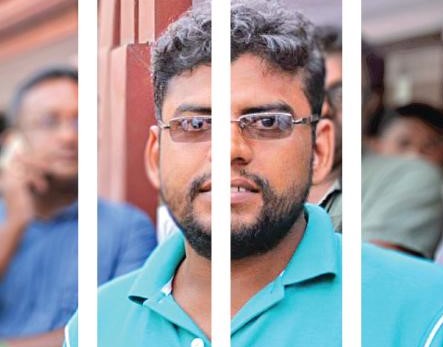Image: Writer Shasthika Sathkumara has been in custody without any charges for nearly 100 days!
Mr. Chandana Wickramaratne,
Acting Inspector General of Police,
Police Headquarters,
Colombo 01.
Re: Arbitrarv Arrest
In the aftermath of the terror attacks perpetrated on April 21 , we appreciate the efforts taken by your department in the investigation process to identify persons involved. While the security measures are completely justifiable under the present circumstances, the Human Rights Commission of Sri Lanka wishes to emphasize the need to ensure that arrests are made only on the basis of reasonable suspicion.
The Commission has recently received a number of complaints alleging illegal arrests. Some pertain to arrests made due to cultural misunderstandings or uncertainly and others due to suspicions expressed by members of the public. For example, one woman had been arrested due to a motif on her dress assumed to be inciteful; in some other instances persons have been arrested for possessing literature in Arabic even before ascertaining the contents; arrests have been made due to public pressure such as an arrest of a trader because some persons feared he had applied a toxic substance to certain garments he was selling. It most instances, the Commission observes that police investigations are conducted after the arrest.
In light of the above, the HRCSL recommends the following guidelines in order to avoid arbitrary and illegal arrests:
1. Whenever an arrest is to be made there should be solid evidence to form a reasonable suspicion pursuant to proper investigations. Arrests should not be made merely on hearsay.
2. Where cultural issues are involved, such as the identification of religious symbols or identifying contents written in an alien language, proper expert opinion should be obtained.
3. Where identification of chemical substances or contents of computer files or video footage or the like are involved expert opinion should be obtained.
4. It is vital that the arrests are made not before, but after receiving credible information based on expert analysis and opinion, and on reasonable suspicion. A-/
It is trite law that arbitrary arrests violate the Constitution. We wish to highlight the judgment of the Supreme Court in Naomi Michelle Coleman v. The Hon. Atnmey Gerueral S.C (FR) Application 13612Aru S.C.M 15.11.2017 where Ms. Coleman’s arrest. detention and deportation due to displaying a tattoo of the Buddha was held to be violative of Article 12(1) and 13(1) of the Constitution, and resulted in compensation and costs being required to be paid amounting to Rs,800,000/- . The Supreme Court found that there was no possibility of a public outcry, though the police so alleged, due to the display of such a tattoo.
Therefore, please be good enough to bring these guidelines to the attention of police personnel with strict instructions requiring compliance.
Thank you,
Charrperson , Human Rights Commission of Sri Lanka
Dr. N. D. Udagama
Clrair Person
Human Rights Commission of Sri Lanka
